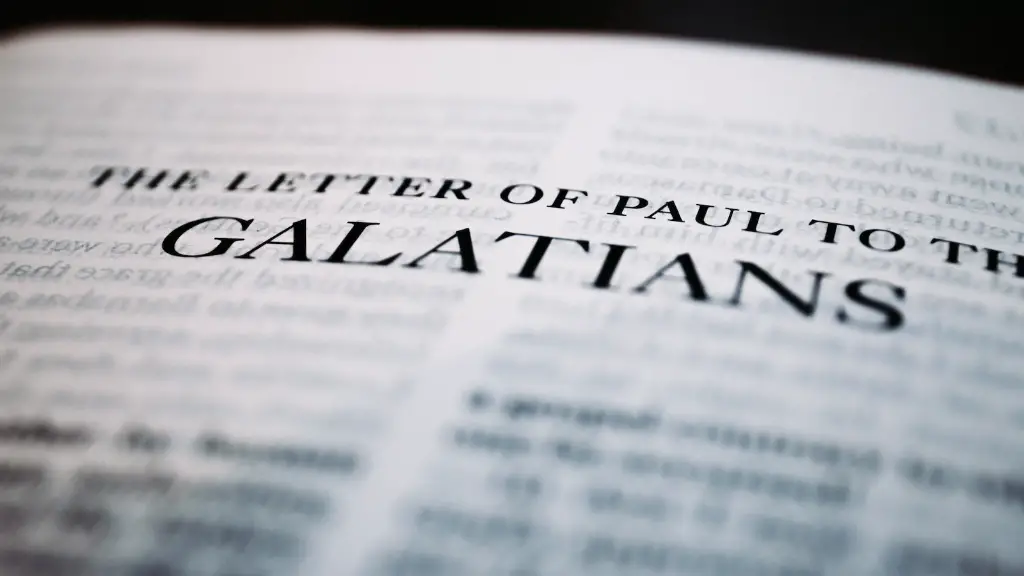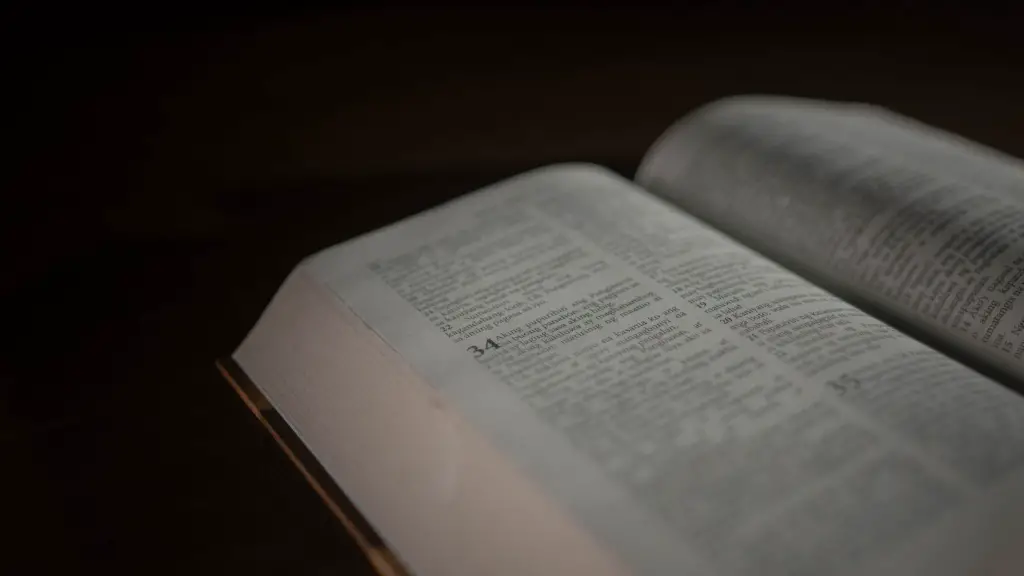Cultural Oppression
The Bible is filled with verses that discuss oppression. Ancient peoples were often taken as slaves or oppressed by those in power. Slavery and oppression were a regular part of life in Bible-times and are often referenced in the text. It’s important to look at the words used in the Hebrew Bible to gain a better understanding of what the verses are trying to say. The word “oppress” is used in many verses and can be translated from the Hebrew to mean “force down”, “trouble”, or “violently assault”.
In the Bible, the word “oppression” is used to refer to a variety of different forms of mistreatment. From the enslavement of an entire people to the harsh labor practices of a wealthy individual, oppression is part of the narrative of the Bible. It’s shown as an example of the struggle of life in ancient times. Oppression is used in the Bible both to describe physical oppression, as well as spiritual oppression.
In the Old Testament, the Israelites are frequently oppressed by the Egyptians. The Book of Exodus tells the story of how the Israelites were brought out of Egypt after years of slavery and were given freedom by God. This is a key part of the Bible’s story – God liberates His people from the oppression of another power. He also sets up laws and commandments that are meant to protect the oppressed from further mistreatment.
Impacts of Oppression
The Bible speaks of oppression not only in terms of physical mistreatment, but also shows how it can lead to spiritual suffering. The Israelites are warned about the consequences of oppressing the poor, as well as oppressing their own people. God says that those who oppress someone else will be “cut off from among His people” (Exodus 22:22).
In addition to spiritual suffering, the oppressed often faced physical poverty. Throughout the Old Testament, the Israelites are frequently taken into captivity and enslaved by other nations, who oppress them with unjust labor practices and extreme fines. This leads to a great deal of suffering for their people.
The Bible also makes it clear that God is not on the side of oppression. He frequently stands up for the oppressed and delivers justice to those who mistreat. He calls on the wealthy and powerful to protect the vulnerable and ensure they are being treated fairly.
Oppression of Women
The Bible also speaks out against the oppression of women. For example, in the Book of Deuteronomy, God says that women should not be forced into a marriage and that adult women must be consulted when it comes to decisions about their lives. Women are also warned about men being unfaithful and warned against men who exploit them for financial gain.
It is important to note, however, that women in ancient times were generally not seen as equal to men. They were often deprived of basic rights and freedoms and expected to stay in their place. They were expected to be subservient to their husbands and, in some cases, could even be sold as slaves. Despite this, the Bible acknowledges that women are valuable and precious in God’s eyes and should not be treated as less than.
Oppression of Slaves
The Bible also addresses the issue of slavery. While slavery was practiced in ancient times, and is mentioned in the Bible, there are verses that make it clear that the ancient Israelites were expected to treat their slaves with respect. For example, it says that slaves should be treated fairly and should not be mistreated.
The Bible also emphasizes the importance of providing slaves with their freedom. It says that, if a slave truly loves their master, they should be set free and allowed to go wherever they wish (Exodus 21:2). The Bible also mandates that masters give their slaves generous wages and provide them with days of rest (Leviticus 19:13).
Oppression of Widows and Orphans
The Bible also speaks out against the oppression of widows and orphans. Widows were often taken advantage of and were seen as vulnerable and easy targets. However, in the Bible, it is made clear that God cares for the weak and the oppressed, and that rulers should ensure that widows and orphans are not mistreated.
The Bible also mandates that rulers should protect widows and orphans by providing them with access to justice. God commands His people to “deliver the afflicted and needy” and to “not oppress the widow, nor the fatherless” (Exodus 22:22-23). This commandment is echoed throughout the Bible and is an important reminder of God’s commitment to justice and mercy.
Oppression of the Poor
The Bible also speaks out against the oppression of the poor. In ancient times, the wealthy took advantage of the poor and often abused their power. The Bible makes it clear that this type of behavior is not acceptable. Throughout the Old Testament, it is made clear that God expects rulers to ensure that the poor and vulnerable are treated fairly.
In the Book of Proverbs, it says that “he who oppresses the poor reproaches his Maker” (Proverbs 14:31). This verse shows that God does not tolerate the mistreatment of the vulnerable, and encourages people to take responsibility for looking after those who need help.
Oppression in the New Testament
The New Testament also speaks out against oppression. In the book of Matthew, Jesus warns that those who oppress the poor will be held accountable for their actions. He speaks of a judgment in which those who have not treated others with love and care will not inherit the Kingdom of God.
Jesus also teaches that those who oppress the widow and orphan will be harshly judged. He warns his followers not to mistreat those who are weak and vulnerable. Instead, He encourages His followers to act with compassion and love towards those who are most in need.
Oppression in the Bible Today
Oppression is still a problem today, and the Bible still speaks out against it. In many parts of the world, the vulnerable are taken advantage of and are deprived of basic rights. The Bible reminds us that every person has value and dignity and should be treated with respect. God calls on us to stand up for the oppressed and to seek justice for all.
The Bible also reminds us that we are all responsible for protecting the weak and ensuring that their rights are respected. Following the example of Jesus and listening to the teachings of the Bible can help us to fight oppression in our world today.
Christian Perspective on Oppression
From a Christian perspective, oppression is seen as an evil that must be fought against. The Bible urges believers to stand up for the oppressed and to be a voice for those who have no voice. The Church often speaks out against oppression and encourages its members to stand up for justice.
Christianity tells us that everyone is made in the image of God and, as such, deserves to be treated with dignity and respect. Christians are encouraged to use their power and influence to fight against oppression in all its forms and to stand up for those who are vulnerable.
Implications of Oppression
Oppression can have far-reaching implications. It often leads to poverty, violence, and suffering. It can lead to the destruction of communities and cultures and can stunt the growth of nations. Oppression often leads to further oppression, as the oppressed are often taken advantage of and are not given the basic right to speak out and defend themselves.
The Bible reminds us that oppression is not acceptable and that we must do everything in our power to fight against it. It is up to all of us to listen to the teachings of the Bible and to work to create a world where everyone can be treated with dignity and respect.
Addressing Oppression
In order to address oppression, we must recognize the complexity of the issue and listen to those affected by it. We must be willing to stand up for the vulnerable and to use our power and influence to fight against inequality and injustice.
We must also take steps to ensure that the oppressed are given what they need to rise up and fight against their oppressors. This includes economic opportunities, access to education, and access to justice. We must also work to ensure that those in power are held accountable for their actions and that their abuses of power are recognized and addressed.
Finally, we must recognize the role that we each play in addressing oppression. We must listen to the stories of the oppressed and lift up their voices. We must also look for ways to help others who are in need and to speak out against oppression whenever we see it. Only then can we hope to make a lasting impact on the issue of oppression in our world.


